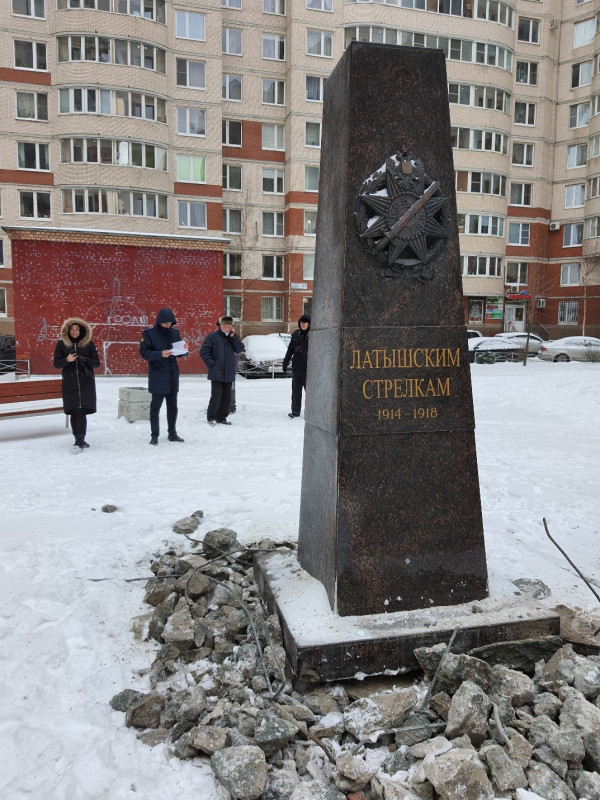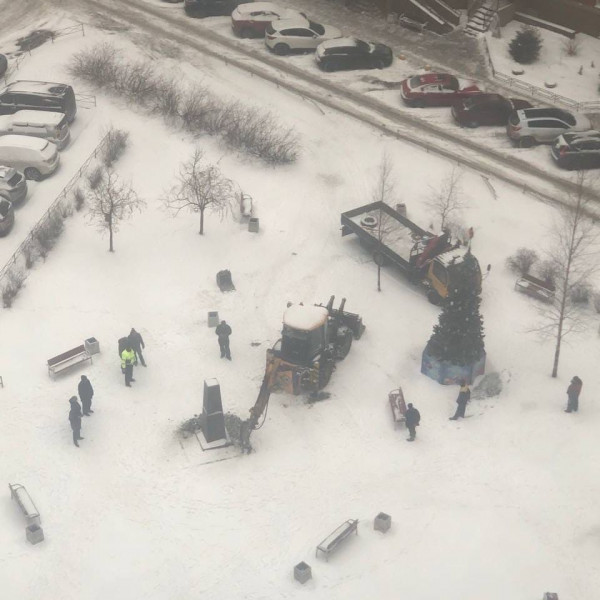Monument to Latvian riflemen was dismantled in Russia
In St. Petersburg, there is Latvian Riflemen Street. In 2016, on a private initiative, a monument to Latvians who fought in the Tsarist Russian army was erected on this street - a granite stele. On January 22 of this year, the memorial site was leveled, and it happened a month before the Red Army cannon disappeared from the pedestal in Jēkabpils.
The war of monuments between Latvia and Russia is intensifying and reveals the hypocrisy of the so-called Russian world - Russkiy mir. While the Kremlin categorically demands Latvia and other countries to take care of the monuments of the Soviet occupation regime and the signs of the Red Army, in Russia a monument that does not fit the desired Kremlin memorial policy is demolished without care. Here it would be good to repeat what Nina Volkova, a resident of St. Petersburg, wrote - precisely regarding the removal of the riflemen monument. If you shoot the past with a gun, the future will shoot you with a cannon. And the Jēkabpils cannon has definitely fired as if defending the riflemen monument.
In fact, the story of a monument built in the courtyard of an apartment building and now destroyed looks like a provocation from the very beginning. This saga is described in detail in the thematic issue "ПЕРСПЕКТИВА РАЗВИТИЯ ЖКХ" (Development Prospects of Municipal or Urban Engineering). The newspaper reflects various problems of apartment cooperatives, and from the moment of its installation in 2016, the monument to Latvian riflemen became one - in the yard of apartment buildings on the Latvian Riflemen Street 15 (1st, 2nd, 3rd building) and 17 (1st building). In the residential building complex Ladozhsky Park.
Asked Putin for help

The company that managed these buildings, Городские Инновационные Технологии (City Innovation Technologies), went bankrupt. It began its operations by repurchasing territories from the previous managers along with dozens of building management contracts. The ambitions were high, and the owners of the company decided to immortalize them with their name in the City Encyclopedia program by placing monuments near the managed houses, which explain the names of these streets. The intentions seemed good, but the problem is that this initiative was not coordinated with the city authorities, and the monument to the Latvians turned out to be the cause of a serious scandal. A stele - just like the ones placed in cemeteries - was erected on Latvian Riflemen Street and the residents whose children play in the courtyard were very dissatisfied. The monument is undeniably gloomy, and there were cases when children fell and got injured while climbing all over the polished granite. Residents wrote complaints, turned to the district administration. When that achieved nothing, they also wrote to Russian President Vladimir Putin. So that he would help get rid of the monument to Latvian riflemen. After that, the district administration immediately took action and initiated legal proceedings against the owner of the monument.
And an excavator arrived
One court, another court, and the claim was upheld. On June 13, 2019, the Neva District Court ruled that the monument must be dismantled within 30 days. However, the company still did not remove the stele. Eventually, a bailiff was involved. An excavator and a truck with a crane arrived on January 22 this year. Residents came to watch - some were happy that they would now be able to make a playground for children, others were angry that the destruction of the monument was blasphemy to history.

From Latvia's point of view, what happened looks bad. Neatkarīgā has already reported that in recent years Russia has been pursuing a very aggressive policy of monument propaganda in Latvia, through its embassy polishing and covering with carnations practically every piece of concrete that reminds of Red Army feats (read - crimes). At the same time, Latvia's efforts to honor its fallen and slain in Siberia people are being hampered in Russia. In Valmiera, the Soviet memorial has been restored, but in the town of Kolpashevo in the Tomsk Oblast, the memorial stele still sits in a warehouse, and there are still no memorials in the Kommunarka mass cemetery in Moscow, where about 50 Latvian citizens are buried - murdered diplomats, statesmen, military personnel and cultural workers.
Such is Russia's policy - some fallen are better than others. Russians are better than Latvians.
Vandalism in the style of St. Petersburg
In the Russian-speaking Internet environment, Alexander Rzhavin, an activist of the Russian community, has drawn attention to the story of the Latvian Riflemen's Monument in St. Petersburg. He named his publication "Russophobic vandalism in the style of St. Petersburg", emphasizing that by turning against Latvian riflemen, Russia is turning against its own history:
"Thousands of Latvians died in 1914-1918, fighting side by side with their Russian comrades. But the descendants of the latter, no matter how despicable this is, have descended into blatant xenophobia and vandalism." And then they are surprised that monuments to Russians and Soviet soldiers are being dismantled in other countries. "I'm sorry, but what example do the Russians themselves set?! Wake up! You did not demolish the monument to just Latvians. You demolished the monument to your own Russian soldiers, Russian patriots!”
Let the historians measure how patriotic to Russia were Latvian riflemen, but the fact that Latvians have been present at many important times for Russia is indisputable. And therefore the demolition of this monument is particularly controversial from Russia's point of view. Maybe the yard of apartment buildings wasn't the right place to put it in, but no one offered any better.
Just a landscaping element
Russia has reacted very sharply to the theft of the Krustpils cannon. It has submitted a note to Latvia and also initiated a criminal case. The cannon is a symbol of aggression. The stele is a symbol of remembrance and mourning. If and how Latvia should react to what happened, Neatkarīgā asked the association Brothers' Cemetery Committee, which, based on a government authorization, cooperates with Russia in matters of war victim memorials. The head of the association Arnis Āboltiņš says that the installation of this obelisk was a private initiative, which has not been coordinated with the Brothers' Cemetery Committee or the Consulate of the Republic of Latvia. There are also no reports that the Latvian side or Latvian diaspora organizations have financed or otherwise supported the erection of the memorial. The status of the monument is (or more precisely was) a “decorative element of the city's public outdoor space or an element of landscaping in the street named after Latvian Riflemen”. The burials of riflemen are not linked to this particular place in St. Petersburg. The street was named after Latvian riflemen by the St. Petersburg municipality, and the municipality is also entitled to decide on decorative objects or memorials in its territory. Arnis Āboltiņš adds:
"Of course, one can regret the ill-considered decision to dismantle the memorial associated with the Latvian national units of the Russian Empire, but sadly not much more can be done.
The opinions of the local community of St. Petersburg about Latvian riflemen in general and Latvian red riflemen specifically are also ambiguous.”
Was the Krustpils cannon stolen because a memorial to Latvian riflemen had previously been dismantled in St. Petersburg? Probably not. However, when arguing Latvia's position regarding the missing cannon, the missing stele would be at least a fact worth mentioning.
*****
Be the first to read interesting news from Latvia and the world by joining our Telegram and Signal channels.
